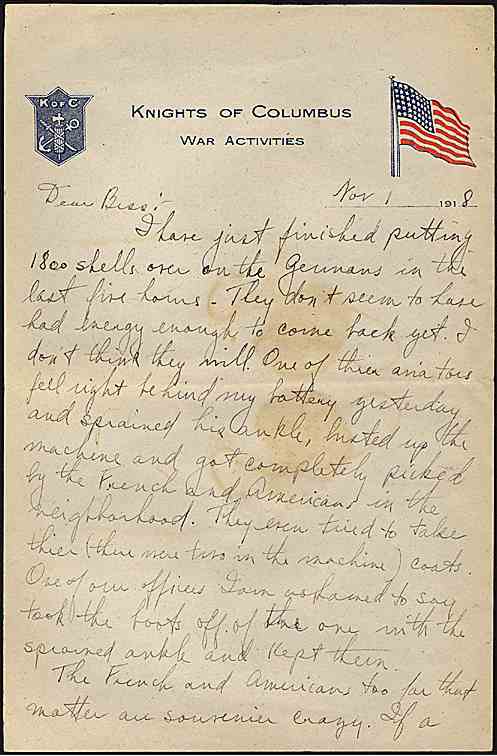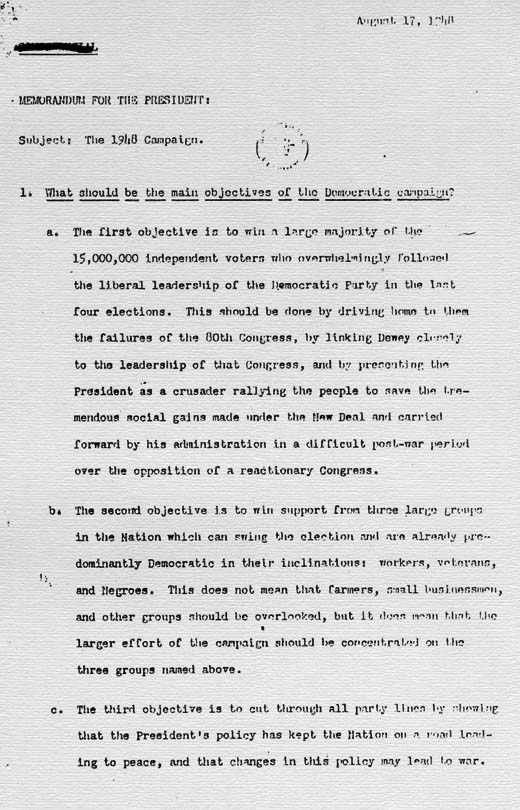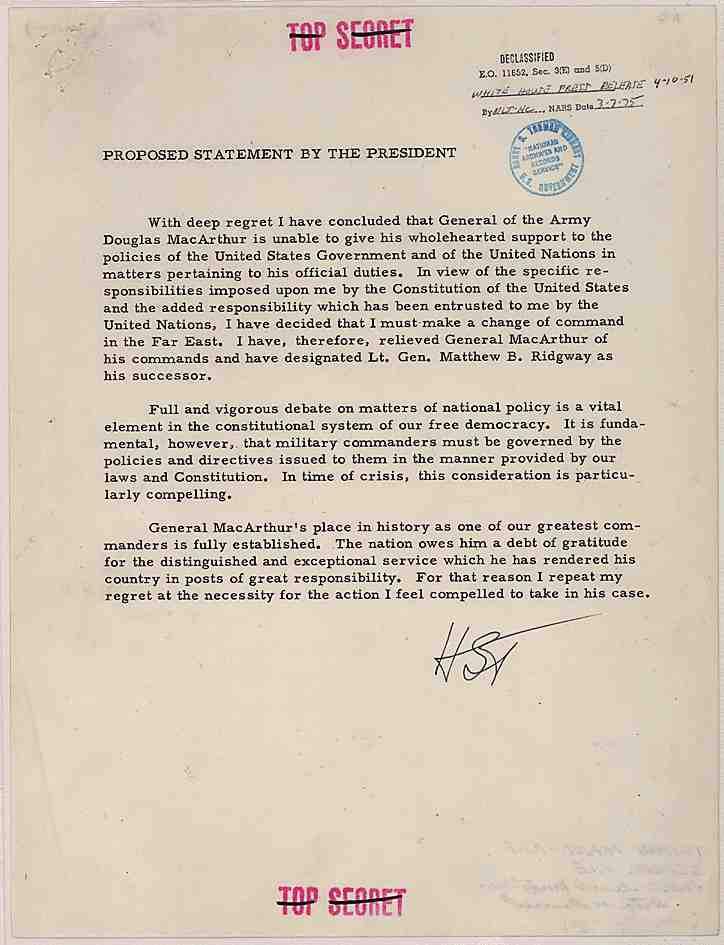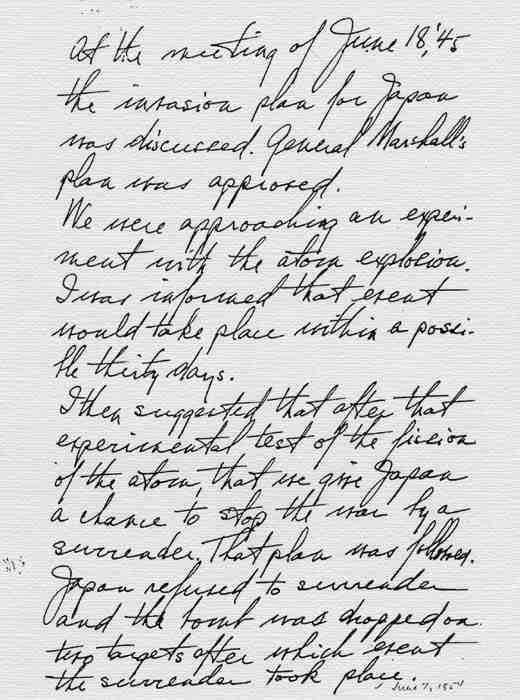$14.95
Harry S Truman Presidential Papers - Download
Harry S Truman Presidential Papers
6,580 pages of Harry S. Truman presidential papers.
Selected documents include letters to Bess Wallace Truman dating from 1910, selections from the official file, post presidential papers, papers of Clark Clifford, Charles Ross, George M. Elsey, Robert E. Hannegan, and Harry B. Price. Also included among the papers of Joseph M. Jones, is a discussion of the Truman doctrine relating to Greece and Turkey and the Marshall Plan. The documents from the "Long Hand Notes File" include handwritten notes on subjects ranging from world affairs to the difficulties of dealing with General Douglas MacArthur.
Major section coverage of the files include:
Atomic Bomb Decision. Files date from 1945 to 1953. Documents include coverage of the Groves Project AKA the Manhattan Project, minutes of the meeting held at the White House on Monday, 18 June 1945, evaluation of situation regarding the War in the Pacific against the Japanese, strategic bombing survey, study of war-time use of the atomic bomb by the Interim Committee chaired by Robert Oppenheimer, Truman diary entries, and Truman's reaction to the historical response to his decision to drop the bomb.
Korean War. Documents cover early events of the Korea War including: The deployment of the third of General Douglas MacArthur's four occupation divisions committed from Japan; A sweeping North Korean attack from the west and continuing frontal assaults press the American and South Korean troops operating under the United Nations flag into a narrow defensive position around the port of Pusan and the temporary South Korean capital, Taegu; National security questions, including the island of Formosa; The so-called "Stand or Die Order," encouraging American troops to hold their defensive positions, even as the North Korean appearance on the western flank threatens Pusan, logistical lifeline to Japan; MacArthur visit to Formosa for an inspection trip; South Korean and U.S. troops withdraw into the Pusan perimeter; North Korea attacks along the entire line in the beginning of the Battle of the Naktong Bulge; The Eighth Army defends Taegu; The U.S. 7th Division in Japan begins augmentation with South Korean draftees as the KATUSA program is established; Plans for the Inchon landing; Final approval for the Inchon amphibious landing is given by the Joint Chiefs of Staff; National Security Council approval of military operations north of the 38th parallel; and MacArthur's invasion force assembling off the shore from Inchon, port city of the South Korea.
President Harry S Truman Diaries (1947-1953)
The diaries file contains 80 pages of entries in diaries including the 1947 "lost" diary made by President Harry S Truman in 1947, 1949, and 1951-53. There are no diaries for 1948 and 1950.
President Truman was not a consistent diarist. He did not see the necessity to constantly keep a diary. When an event occurred, that he believed was consequential, he would often make a longhand notation on a loose sheet of paper, especially before 1947 . Researchers have had access to that material and diary entries made from 1949 to 1953, for decades.
In 1965, archivists at the Truman Presidential library were cataloging and housing material received from the National Archives, including a date book President Truman received as a gift from the president of the Real Estate Board of New York Inc. The board's name was on the cover, and the first 160 pages contain member listings and advertisements. It was placed with the library's book collection. In 2003, for the first time someone looked past the front material and saw 47 entries from 1947 in President Truman's handwriting. The 1947 diary contained more entries than all known bound Truman diaries combined.
Truman's diary entries pertain to such topics as the death of his mother, the firing of General Douglas MacArthur, Recognition of the State of Israel, the Marshall Plan, the death of King George VI of Great Britain, the 1947 State of the Union address and the inauguration of President Dwight D. Eisenhower.
Highlights include:
Truman on possible Eisenhower presidential candidacy in 1948 - July 24, 1947 Entry
President Truman when asked always denied that he entertained the idea of having General Eisenhower run for president in 1948, with Truman as his running mate. A July 23, 1947 entry reveals that Truman while discussing the political landscape with General Eisenhower, did make such an offer. Truman was worried that General Douglas MacArthur would run for president on the Republican ticket. "I told Ike," Truman wrote, "that if he (MacArthur) did that he (Eisenhower) should announce for the nomination for President on the Democratic ticket and that I'd be glad to be in second place, or Vice President." Truman continued, "I like the Senate anyway. Ike & I could be elected and my family & myself would be happy outside this great white jail, known as the White House."
Truman's anti-Semitic remarks recorded on July 21, 1947 Entry
On July 21, 1947, Truman had a conversation with former treasury secretary from 1934 to 1945, Henry Morgenthau, who was appointed by President Franklin D. Roosevelt in 1933. Truman begins a three-page entry about the post-war Jewish issue with anti-Semitic remarks beginning with, "Had ten minutes conversation with Henry Morgenthau about Jewish ship in Palistine (sic). Told him I would talk to General Marshall about it. He'd no business, whatever to call me. The Jews have no sense of proportion nor do they have any judgement on world affairs."
The Berlin Airlift. Files include Central Intelligence Agency files Cabinet meeting materials and the papers of Clark Clifford, Truman's Press Secretary.
The Marshall Plan. Documents include speech drafts, policy statements, telegrams, letters, and memos dealing the planning and implementation of the Marshall Plan.
United Nations. Files cover: Adding countries to the United Nations; Allied reparations committee; Annual reports; Disarmament commission; Secretary general & secretariat; Establishing headquarters in New York; San Francisco Conference; Delegates, ambassadors & representatives; and The United Nations General Assembly.
NATO. Files cover: Development and ratification of the North Atlantic Treaty, Development of NATO as an organization; and NATO Commander Dwight D. Eisenhower,
The 1948 Campaign. Documents cover campaign strategies, "Whistle Stop" tour, campaign polls, and election results
Israel. White House correspondences regarding the recognition of Israel.
FILE SECTIONS
Section 1 - Truman Letters
Section 2 - Atomic Bomb Decision
Section 3 - Korean War
Section 4 - The Berlin Airlift
Section 5 - Truman Doctrine
Section 6 - The Marshall Plan
Section 7 - United Nations
Section 8 - NATO
Section 9 - The 1948 Campaign
Section 10 - Recognition of Israel
Section 11 - Diaries (1947-1953)






